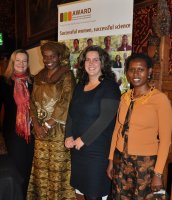 On the eve of International Women’s Day, two leading African women agricultural scientists joined Gordon Conway, Ag4Impact and other U.K. experts in parliament
On the eve of International Women’s Day, two leading African women agricultural scientists joined Gordon Conway, Ag4Impact and other U.K. experts in parliament
Empowering Women
On the eve of International Women’s Day and against the backdrop of deepening food crises across sub-Saharan Africa, two leading African women agricultural scientists joined U.K. experts at a lunchtime parliamentary briefing of the All Party Parliamentary Group on Agriculture and Food for Development today on “Effective Solutions for Agricultural Development through Empowered African Women Scientists.”
An estimated 239 million people in sub-Saharan Africa are hungry, according to the UN Food and Agriculture Organization. The urgency to boost food production is clear, and ensuring the continent’s food security will require mobilizing the best minds from every discipline, especially women, who are the backbone of African agriculture. However, although the majority of those who produce, process, and market Africa’s food are women, only one in four (25%) agricultural researchers is female. Even fewer, one in seven (14%), hold leadership positions in African agricultural research institutions.
African Women in Agricultural Research and Development (AWARD) is addressing that gap by building the capacity of African women scientists conducting pro-poor agricultural research.
Dr. Sheila Ommeh, a Kenyan winner of an AWARD Fellowship and a molecular geneticist whose research focuses on breeding disease-resistant indigenous chickens, commented: “Seventy-six percent of all Kenyan rural households are engaged in some kind of poultry rearing. It’s critical to food security. However, their flocks—and their livelihoods—are endangered by bird flu and Newcastle disease. I’m researching these diseases and am trying to make the ‘chicken agenda’ a priority for research institutions and governments.”
AWARD fellow Christine Mukantwali, a senior scientist with the Rwanda Agriculture Board, is also concerned about the poor. She is researching pineapple fruit processing and preservation methods. “In Rwanda, post-harvest losses of fruits and vegetables stand at 40 to 80 percent,” she said. “This is unacceptable in a country where 78 percent of the rural population suffers from limited or no access to food and 45 percent of children under the age of five experience moderate chronic malnutrition, according to World Food Programme reports.”
Pineapple harvests spoil due to lack of storage facilities and processing equipment, as well as processors’ limited technical skills and knowledge about market requirements, says Munkantwali. Through her research, she is helping small-scale pineapple processors to increase the shelf life of their products and extend their markets regionally.
“Women researchers such as Ommeh and Mukantwali are critical to solving Africa’s food challenges, but they need support to get their research results into the hands of those who need it most—smallholder farmers,” says AWARD Director Vicki Wilde.
“If women are to advance in their careers and be fully represented at decision-making levels, then they need to be equipped with both the hard scientific skills and the so-called soft skills of leadership and negotiation that are not usually taught in the university classroom or modeled in the lab,” said Wilde. “AWARD equips women scientists with these competencies, and we are seeing dramatic changes. For example, from our first two rounds of AWARD fellows, 120 women, almost one-quarter of them have been promoted and another quarter have completed their Master’s or PhDs. Almost half have received other awards: recognitions, fellowships, scholarships, and grants.”
The panel, moderated by Lewisham East MP Heidi Alexander, also included Dr. Camilla Toulmin, Director of the International Institute for Environment and Development (IIED), Joseph Cerrell, Director of the European Office, at the Bill & Melinda Gates Foundation, and Monique Mikhail, Sustainable Agriculture Policy Adviser with Oxfam GB.
Sir Gordon Conway, Professor of International Development at Imperial College London and leader of the agricultural advocacy group, Agriculture for Impact, facilitated a discussion session. He commented, “Closing the gender gap in African agriculture could be the missing link in addressing Africa’s food security concerns. These talented women are conducting critical research and have presented today not just the challenges, but solutions.”
The briefing coincided with the introduction of the first Women’s Empowerment in Agriculture Index, developed by the United States Agency for International Development (USAID), the International Food Policy Research Institute (IFPRI) and the Oxford Poverty and Human Development Initiative (OPHI) at the University of Oxford. The innovative new index marks a breakthrough in the measurement of the empowerment and inclusion of women in the agricultural sector.






